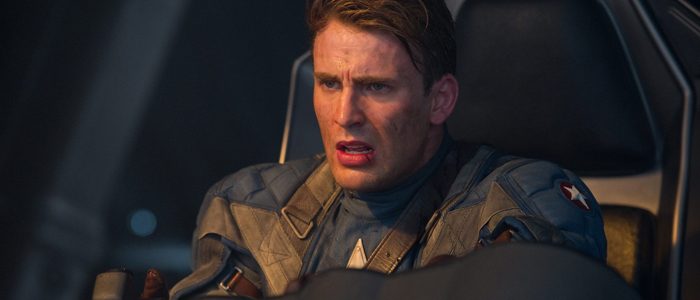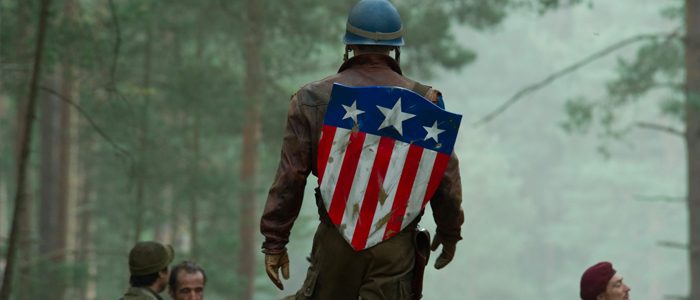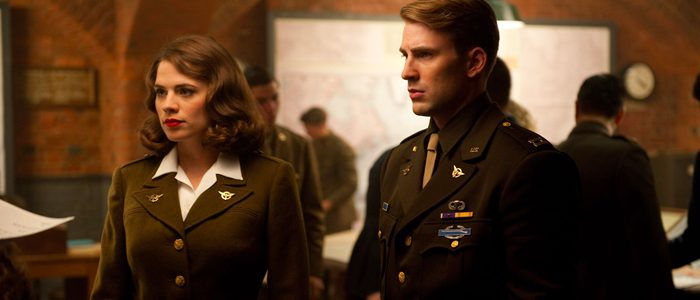Road to Endgame: ‘Captain America: The First Avenger’ Introduces a Selfless Hero in a Politically Muddled Movie

(Welcome to Road to Endgame, where we revisit all 22 movies of the Marvel Cinematic Universe and ask, “How did we get here?” In this edition: Captain America: The First Avenger attempts to establish Marvel’s moral compass.)
Steve Rogers is the moral center of the Marvel Cinematic Universe, a dynamic that holds true even for films he doesn’t appear in. Broken down to his basics, he’s the benchmark for righteousness in an ever-shifting political landscape, even when that righteousness is called into question. This has been his role in the comics for most of the 21st century, making him a vital addition to a film series so steeped in post-9/11 military parallels.
Captain America’s movie origin, like that of his 1940 comic book counterpart, begins during World War II. It’s an arguably more black-and-white setting compared to the complexities of modern geopolitics — the kind of complexities the Iron Man films try (and often fail) to capture — providing both the Star Spangled Man and the larger Marvel Universe a framework for their outlook on heroism.
That said, while Steve Rogers, the man in isolation, is a beacon of goodness, Captain America, the symbol within a larger narrative context, falls victim to Marvel’s penchant for diluted ideology.

Who’s Strong and Brave, Here to Save the American Way?
What might be clearer to American audiences now than it was in 2011 is the difficulty of selling a superhero with “America” in his name. In Russia, Ukraine, and South Korea, the film was simply titled The First Avenger. To people unfamiliar with his stories, Captain America’s image often conjures the rah-rah, military jingoism exported by America’s war and action films — Iron Man, Iron Man 2, Captain America: The Winter Soldier and Captain Marvel are among hundreds of Hollywood movies made with military assistance — not to mention America’s export of actual war.
This perception holds true even for Americans unfamiliar with modern Captain America stories. As much as comic writers like Ed Brubaker might attempt to subvert his “America First” nationalist image, the character’s big-screen stories are often open to political interpretation, a continued problem with Marvel’s reliance on metaphor in a way that lets real-world structures off the hook.
The idea of Captain America as a nationalist symbol is not without precedent. In the 1950s, he spent several years punching even suspected Communists in the face before his Timely Comics series was cancelled. Though, when the character was brought into the Marvel fold in 1964, this flag-waving “Commie Smasher” was retroactively revealed to have been an imposter. The “real” Captain America, a righteous protector, had been frozen in ice since World War II. He was resurrected in The Avengers #4 as a man out of time, after which he became a regular fixture of the team, thus giving birth to the origin story seen in the MCU.
It’s been eight years since Steve Rogers made his big-screen debut. Certain territories still drop “America” from the title; some fans simply know it as the “First Avenger” series — America’s marketability hasn’t exactly improved in recent years — but Captain America has since been part of four (soon to be five) billion-dollar box office hits. Even his second solo outing, The Winter Soldier, made twice as much money globally as its predecessor, and that was without the help of Robert Downey Jr.’s Tony Stark. Despite the flag on his chest, and the jingoistic Hollywood traditions he echoes, Steve Rogers has become a mainstay of international popular culture.
A character named “Captain America” doesn’t achieve this global feat by leaning in to nationalism. But he doesn’t earn $2.6 billion domestically by openly opposing nationalism either.
While staying explicitly politically neutral would make for a less engaging narrative (and an actively political one regardless, since Captain America still punches people while draped in the American flag), the Marvel Cinematic Universe tries to have its cake and eat it too, spreading Steve Rogers across all sides of the political spectrum. In stories set in the past, the series has Rogers brush up mildly against militaristic authority in ways that get the military on his side. In modern day, however, he opposes forces who, while representative of government overreach, are far enough in the realm of fantasy that his opposing them feels almost without consequence. Not for Steve Rogers himself, mind you – he remains one of the most alluring and heartfelt facets of these films, thanks in part to his personal sacrifices. However, the series’ meta-narrative remains largely un-challenging when it comes to having anything of consequence to say.

Who Vows to Fight Like a Man for What’s Right, Night and Day?
Thanks to the character at its core, Captain America: The First Avenger hurts — in a good way — despite its narrative missteps. The film’s condensed second act ends up rushing plot threads, and skips entire dramatic beats that might’ve fleshed out Rogers’ story. The lack of time dedicated to Bucky Barnes (Sebastian Stan) and his death is one of the film’s major flaws (one the series as a whole is still trying to overcome), but the film’s finale still packs an emotional wallop.
Having fended off the Red Skull (Hugo Weaving) long enough for him to succumb to his own arrogance, the humble Steve Rogers steers a plane loaded with warheads and bound for New York City. He speaks to Peggy Carter (Hayley Atwell) over the radio, telling her he has no choice but a suicide mission, or millions of people could die. As he descends, they talk about finally going on their date: “We’ll have the band play something slow,” he assures her, placing a compass with her picture in front of him. “I’d hate to step on your—“
The radio cuts out. Steve Rogers crashes this plane into the ice, somewhere near the Arctic. He wouldn’t be found for nearly seventy years. When he awakens in modern day, the first thing he recalls as he takes in the new world is simply, “I had a date.”
The world was never going to end in Captain America: The First Avenger, a prequel to four different Earth-set films by this point, nor were millions of people going to die in New York. Marvel’s alternate history is only alternate to a degree, so the climax was never really about saving millions of lives, something superhero movies tend to prioritize over personal challenges. Captain America certainly tries to save as many people as possible — he does so in every film — but the narrative stakes in this moment are whether or not Rogers would get to see Carter again.
This conflict packs a punch is because of who Steve Rogers is, and his dramatic function in the series. At his core, Rogers is the same person he was at the beginning of the film: a scrawny kid from Brooklyn who won’t back down from a bully, even if it gets him hurt. He’s that same person during all his appearances. Captain America: Civil War ends with him turning vigilante to rescue wrongly-imprisoned comrades, while Avengers: Infinity War sees his uncompromising morality distilled into a single line: “We don’t trade lives.” He’s the guy who does the right thing, even when it’s difficult, which is precisely why Captain America: The First Avenger ends on a note of tragedy, despite the war being won for his side.
Captain America does everything right. Everything. But he still loses everything in the process, because he’s written to be the only person capable (and more importantly, willing) to pay the cost of doing the right thing.
This is how the movie had to end, logistically speaking. As one moving part of the Marvel machine, Steve Rogers had to go in the ice during World War II and be re-awakened in modern day so he could join The Avengers. But this is also how Steve Rogers’ story had to end, because it’s exactly how it began.
Unlike most Hollywood hero narratives, Captain America doesn’t change. His function is to inspire change in others. He goes through a physical metamorphosis, sure, and his approach to conflict is forever in flux depending on political circumstances, but what’s constant is that he always strives towards righteousness. One might even say he replaced Superman in the global zeitgeist. He’s a little guy at heart who fights for the other little guys, at least on paper, and the flag on his chest is everything America ought to be, rather than everything it is.
Captain America is intended to be a symbol of lofty ideals, the kind America often fails to live up to. Unlike the flag-waving ethos he’s mistakenly thought to have, there’s no actual glory in being Captain America. There’s no victory in winning, and saving people, and doing the right thing, because circumstances force him to do these things by giving up a normal life. The world is robbed of him because he chose to fight, and in the process, he’s robbed of both Carter and his best friend Bucky Barnes, the people who were his world.
As much as the film might be a fantasy, with fantasy Nazis and a space-MacGuffin driving its plot (the first appearance of an Infinity Stone, not counting post-credits scenes), it’s a rousing reminder of the very real cost of standing up for other people, and what it takes to be a hero. But it approaches these ideas in the broadest possible terms.
Continue Reading Road to Endgame >>
The post Road to Endgame: ‘Captain America: The First Avenger’ Introduces a Selfless Hero in a Politically Muddled Movie appeared first on /Film.
from /Film https://ift.tt/2U6KzLi
No comments: